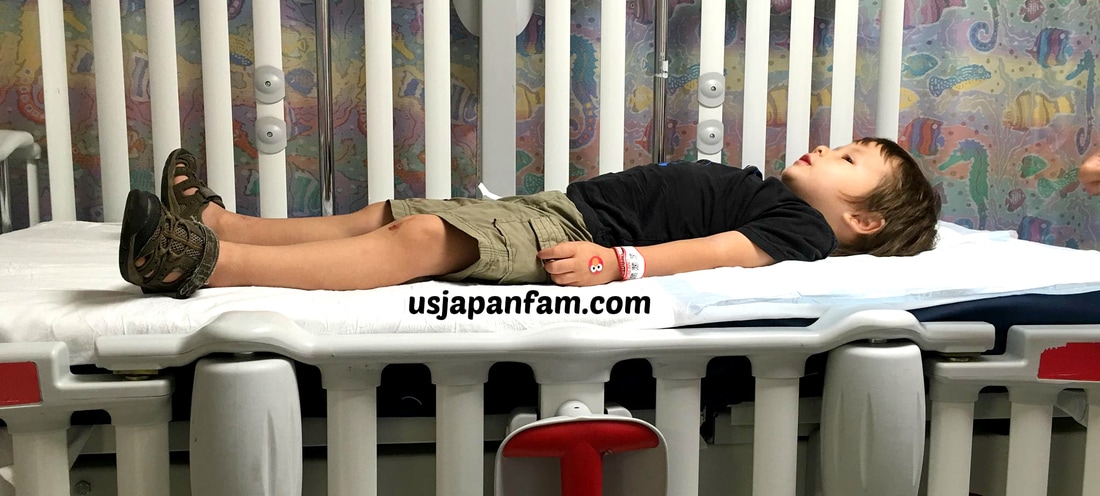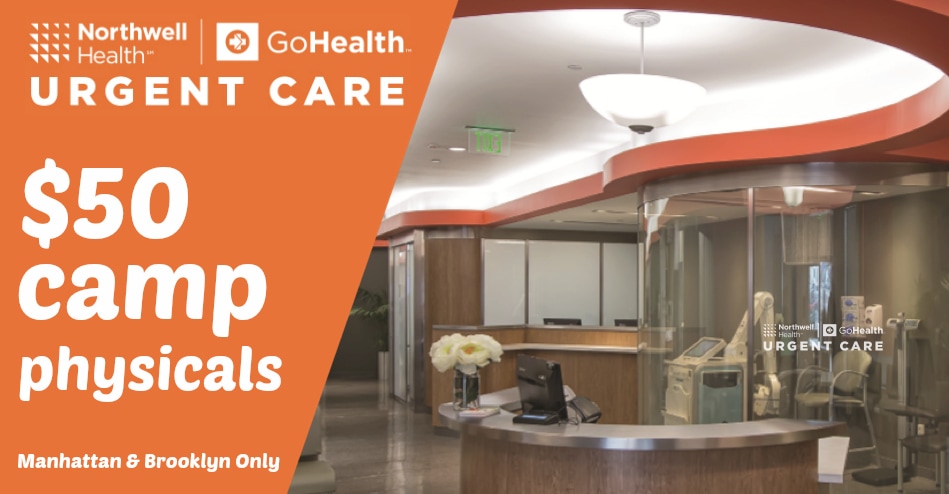|
I don't know about you, but our ER copay is $400. So, I'll pretty much do whatever it takes to avoid that place. Last summer, my 3 year old took a flying leap off of the jungle gym and bit a gaping hole through his tongue. As he sat crying and bleeding all over my husband, I made calls frantically trying to find somewhere to take our son, other than the hospital's Emergency Room. Unfortunately, our pediatrician, nearest urgent care, and nearest pediatric urgent care all told me "go to the ER" and that was that. An Uber ride, couple of hours, 2 stitches, and $400 later, my son was good as new. When it comes to illness and injury, whether an adult or a child, it's not always crystal clear whether you should head to your primary care provider (PCP), urgent care, or straight to the ER. Making the decision can be overwhelming, especially in the moment when someone is really sick or hurt, so I was grateful to attend a very helpful presentation for parents and mommy bloggers at the new Northwell Health-GoHealth Urgent Care in Williamsburg last night and pass on what I learned to all of you!! Why you shouldn't head straight to the ER for every illness & injury:
When is Urgent Care the best option?
What can they do for you at Urgent Care? (The following are applicable specifically for Northwell Health-GoHealth Urgent Cares, but probably apply to most urgent cares)
But obviously, urgent care has limitations and is not the best option for severe and life threatening illnesses and injuries. If the situation is dire and the patient is really struggling, your best bet is to head directly to the ER or call 9-1-1 and start any necessary first aid treatments immediately! When to call an Ambulance (or head straight to the ER):
And finally, some helpful tips and reminders for parents:
Phew - that was a LOT of info, but so important!! I hope you found it useful!!! If you have anything to add on the subject, please please do leave a comment below!! Have you had a good or bad experience at the ER or urgent care? Know of a great local First Aid class? Sharing is caring!! Disclaimer: This post was sponsored by Northwell Health-GoHealth Urgent Care, but I'm no sell out, all thoughts and opinions are my own!!
27 Comments
8/25/2017 09:42:16 pm
I have been trying to figure out when I should take my family to an urgent care center since my sister took her daughter to one this last week. So thank you for clarifying that I should visit one when my normal physician's office is closed. I will be sure to go to a family urgent care if they end up being closed, or even if there is a long line.
Reply
5/17/2018 03:22:59 pm
Thanks for pointing out that urgent care centers are a good place to get an X-ray, your blood drawn, or when dealing with a fever. My daughter has a fever, and it's not at an unmanageable level, just a degree or two higher than normal. Just in case my daughter's fever goes up, I'll have to find an urgent care near us.
Reply
6/4/2019 04:43:32 pm
Thanks for pointing out that some of the things you can do at an urgent care are get an x-ray and get blood drawn and sent to a lab. I am thinking about going to a walk-in clinic because I would like to get an x-ray of my ankle to see if I have a stress fracture. I think it would be more convenient than trying to make an appointment at my family doctor and it would help make sure the process goes quickly.
Reply
9/25/2019 12:18:37 pm
It's great to know that you should go to urgent care if you need stitches. My daughter is wondering where she should go for a deep cut she received. I'll let her know that she should go to urgent care to get stitches.
Reply
6/17/2020 10:13:28 am
I loved how you mentioned that you should know where the closest ER is when you're on vacation just to be safe. My family is going on vacation soon and I was wondering how I could keep everyone safe in case a medical emergency happens. I'll be sure to look for a close ER in the area we're vacationing in.
Reply
6/29/2020 11:08:07 am
I got a cut on my leg that's bleeding a lot, and I'm not sure what to do about it. It's good to know that an urgent care can handle stitches! I'll be sure to visit one as soon as possible, because I think that's what I need.
Reply
7/1/2020 11:51:39 am
My brother believes he broke his rip but is not sure and does not know whether he should go to urgent care or just schedule an appointment with the doctor. I like that urgent care can do X-rays as well and you can skip the long wait time at your PCP or ER. I will let my brother know about this so that he can get himself checked as soon as possible.
Reply
7/17/2020 07:27:42 am
My sister's stomach has been aching for days, and I'm planning to bring her to an urgent care service because its medical bill is cheaper. It's great to learn that an urgent care service could provide rehydrating fluids to my sister, just in case she'll need it. Also, I'm glad you were able to clarify here that if in any case, we happened to drop by, and the PCP is closed, they will still provide a record of our visit.
Reply
9/28/2020 07:50:20 pm
It's good to know from this article that we'll be able to get rapid urine tests at urgent care, especially for my kid. I'm suspecting that he has a urinary tract infection and although it doesn't call for immediate medical attention compared to people in the ER, I want this health issue to be addressed as soon as possible. I'll try to look for nearby facilities that offer this option and see if they can attend to my son.
Reply
9/30/2020 08:35:52 am
That must have been such a trying time for you and your family. I didn't realize that urgent care is able to help with so many different medical issues, such as; IV's and rehydrating fluids. I will have to keep the urgent care in mind the next time a family member gets an injury.
Reply
11/2/2020 03:44:08 pm
It's great to learn that you could get flu and mono tests at an urgent center. My wife and I are wanting to protect ourselves from the flu and we were wondering where we could get tested if we feel sick. I'll be sure to tell her that we should go to an urgent center if we feel sick.
Reply
1/26/2021 03:10:32 pm
That makes sense that the ER is the most expensive. I could see how that would make it not a great option if you need to get a check-up for an illness. I'll take a look into getting a walk-in clinic, or an urgent care next time my son gets sick.
Reply
1/29/2021 11:37:15 am
It's a good point that the emergency room can be pretty scary for kids because they might see serious injuries. My sister has a son that is ill right now and needs to be cared for. She needs to find a local clinic that is used to helping kids so that he gets the proper treatment.
Reply
2/22/2021 11:37:01 am
It's great to hear that you can get the rapid tests for the flu at these facilities so you can then move onto treatment. My sister is trying to get in touch with a medical professional today. She wants to make sure her sick kids get treated properly so that they recover quickly.
Reply
2/26/2021 01:32:49 pm
I appreciate you explaining that blood draws can be done at the urgent care facilities. My sister wants to get some work done soon so that she knows what is going on with her health. She is worried it could be something serious so she needs to get it figured out pretty quickly.
Reply
4/21/2021 01:44:34 am
I like that this post shared that an urgent care center is enough in the event we would like to seek consult for flu. My wife and I just moved to a new town. I will definitely look at the local center for us to consider.
Reply
6/24/2021 11:44:59 am
My husband and I have three little boys and they are constantly getting into trouble. We have heard the urgent care is a great way to get them treated without having to rush to the emergency room every time. Thank you for sharing that an urgent care can clean or glue small wounds.
Reply
7/2/2021 09:59:28 am
I've been having strep throat symptoms, so I want to go to a doctor. It makes sense that this isn't big enough of an emergency to want to go to an emergency room for it. I'll be sure to find a good urgent care for this.
Reply
7/21/2021 03:31:11 pm
It's good to know that urgent care can get rapid strep tests. My daughter has been dealing with a bad sore throat for the past couple of days, and I was wondering where I should take her to get tested for strep as soon as possible. I'll have to look into finding an urgent care facility to take her to so that she can get tested for strep.
Reply
4/20/2022 10:01:30 pm
It helped when you said that at home or in vacation, it is necessary to know your medical options. After moving to our current area, my wife was hoping to find an urgent care clinic for her monthly check-up as she had a hard time going to the hospital, and she asked if I had any idea what would be the best option to do. Thanks to this instructive article, I'll be sure to tell her that we can consult a well-known urgent care clinic as they can provide the maintenance check-up.
Reply
4/22/2022 03:54:26 am
A hospital's emergency department handles patients of all ages who are suffering from life-threatening or life-threatening illnesses. When you need medical help right away, it's the finest option. Urgent Care is the middle ground between your primary care provider and the Emergency Department.
Reply
5/10/2022 05:27:14 am
Thanks' for the info about urgent care. It was very much useful.
Reply
3/7/2023 06:34:03 pm
I'm glad you said that you can get a rapid strep test at an urgent care facility. For the past couple of days, my throat has been in a lot of pain, and it only seems to be getting worse, so I wanted to see if I have strep. I'll have to look into finding an urgent care facility to go to so I can get treated properly if I do have strep.
Reply
Leave a Reply. |
About ME:I'm a NYC metro area mom blogger living in NJ with my Japanese husband & our 3 kids (twins plus 1), focusing on fun and honest product and travel reviews, saving moms time finding the best for their families! Find what you need in the menu bar or search section above! Categories
All
Archives
July 2024
|














 RSS Feed
RSS Feed



